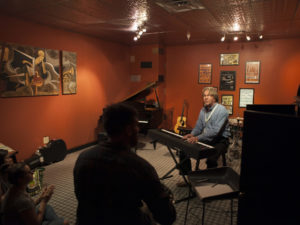 The Reality: Musicians and Addiction
The Reality: Musicians and Addiction
If you listen to much of the music that’s on the radio today, you’ll notice that the beats seem pretty uplifting – pop, country, hip hop and rock instrumentals and technology can make you feel like dancing, but do you really know what the song’s about? Most of us don’t take the time to really look at the lyrics behind these songs and what we’d find is that a lot of musicians are going through painful life experiences. They’re going through divorce, depression, addiction, anxiety and more – and it’s often masked behind the music, behind the publicity and behind the effort that goes into keeping up appearances. A number of famous musicians have battled with addiction and sometimes they are not able to receive help until it’s too late.
Here is a list of some musicians who have struggled with addiction in the past:
- Ozzy Osbourne
- Kurt Cobain
- Britney Spears
- Snoop Dogg
- Amy Winehouse
- Anthony Kiedis
What we do know is that the appearance that we see on the public side is rarely an accurate portrayal of what’s really going on in a musician’s life. Musicians face a lot of pressure in keeping up with the demands to stay on top and many become hard-pressed to find people who are there to truly help them through it.
A Day in the Life
Earlier this year, several musicians spoke up about Demi Lovato’s relapse to the Dallas Observer and Dallas musician Spencer Douglas Wharton weighed in on how much musicians are impacted on a daily basis. He talked about the risk of relapse, expressing that he thinks about it every day. “Musicians, in general, we live a much harder lifestyle than normal people do, for whatever reason. I worry about [relapse] all the time.”
A common misconception is that musicians and other celebrities have success, fame and money – “What problems could they possibly have?” The truth is, that success can come at a price. There are a number of pressures celebrities face every day, such as:
- Being watched by the public – and very, very closely. Headlines can be misconstrued and some celebrities may feel as though they’re being antagonized by paparazzi and fans alike.
- Frequent appearances at red carpet events and other parties may sound like fun, but it leaves little time for musicians to relax, spend time with family or carry out other important personal projects. On top of this, many parties have drugs circulating – and that can easily get into a musician’s hands.
- Intimate dating relationships, which can be a key form of emotional support, often don’t last because of the pressures associated with fame.
- Imagine living permanently under a microscope – and on top of that, you have a hard time telling who really, truly cares about you. BBC Radio highlighted a quote by Megan Fox and her personal experience with fame, relating it to bullying – but on a global scale. She stated, “What people don’t realize is that fame, whatever your worst experience in high school, when you were being bullied by those ten kids in high school, fame is that, but on a global scale. You’re being bullied by millions of people constantly.”
With all of these demands – to look good, to attend events, to market yourself, to stay connected to fans, to take pictures, to attend interviews and so much more – it makes sense that mental health issues and substance use disorders are a key concern for this community.
MusiCares
As more celebrities have gone through deadly and life-altering moments from substance abuse concerns, more efforts are being made to provide support to musicians. For example, MusiCares is a leg from the Recording Academy and provides critical assistance to musicians in the form of financial, medical and personal emergencies. Their focus is on the human resource and welfare aspect of these celebrities, as it’s a great need. More and more organizations have transpired in an effort to provide more support for musicians and hopefully in doing this we can save more lives.
Recovery
Thankfully, mental health and addiction have both become much more widely talked about rather than a taboo topic. The more we’re able to open up about these issues, the more we’re able to help one another – and that’s exactly what some musicians are doing. In fact, several musicians who have taken a stand for their recovery report being much happier and healthier – and while it’s a lifelong journey, recovery is something that has restored them with the ability to focus on what really matters – their health, their happiness, their family and their love for music.
Check out some of the following ways that recovery has helped Kelly Osbourne: “For the first time, I felt hopeful. I knew I’d been given another chance at my life, at my career, at happiness. I wanted to grab it.” – Kelly Osbourne in her book, Fierce
Musicians need to be provided support too, and hopefully over time we can increase that.
Cumberland Heights is a nonprofit alcohol and drug-addiction treatment center located on the banks of the Cumberland river in Nashville, Tennessee. On a sprawling 177-acre campus, we are made up of 2 12-Step immersion campuses, 12 outpatient recovery centers and 4 sober living homes. We believe that each person has a unique story to tell – and that’s why we always put the patient first.
Call us today at 1-800-646-9998 to take the next step towards your happiness and health.










